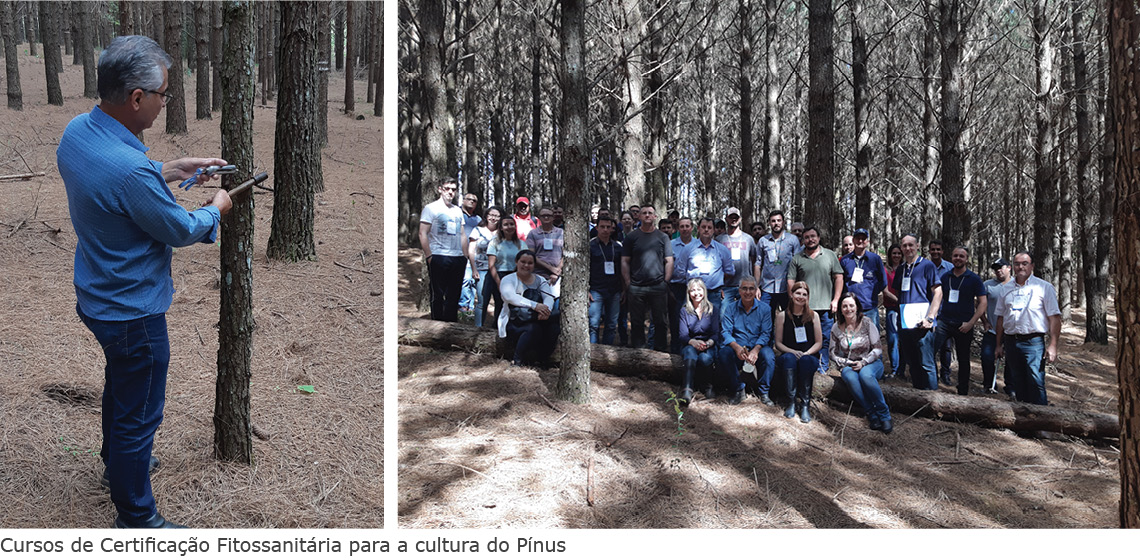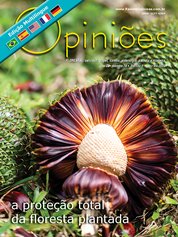Marcílio Martins Araújo
Adapar - Agência de Defesa Agropecuária do Paraná
OpCP70
O papel dos órgãos de defesa agropecuária na mitigação dos danos causados pelas pragas
Nas décadas de 1960 e 1970, os incentivos fiscais para o reflorestamento tiveram grande importância para o setor florestal paranaense. No início, os cultivos foram estabelecidos em áreas marginais da propriedade, plantando e deixando que as árvores crescessem até o corte e a extração da madeira, sem os devidos cuidados e sem o manejo adequado, aguardando apenas para se realizar a extração. Como diziam os primeiros silvicultores: “plantar e aguardar para obter os resultados do plantio”. Mas tudo que se cultiva necessita de planejamento, de cuidados e de manejo, e, somente após o pleno desenvolvimento, se faz a colheita e obtêm-se os resultados.
No final da década de 1980 e início de 1990, tem-se notícia da introdução e disseminação de uma praga florestal, a vespa-da-madeira, Sirex noctilio, que poderia comprometer o equilíbrio e a produção dos cultivos de pínus no Sul do Brasil, cultura que tão bem se desenvolvia nessa região.
Com isso, foi necessária a adoção de tecnologias e ações para manejo dessa praga. Na busca de uma solução duradoura, a Embrapa se aprofundou nas pesquisas para o seu controle, por meio do desenvolvimento de tecnologias e de criação e distribuição do nematoide Deladenus siricidicola, que é um agente biológico que esteriliza as fêmeas da vespa-da-madeira. Assim, ainda na década de 1990, iniciaram-se as medidas para o manejo da praga nos povoamentos de pínus do Brasil. Os estudos e as pesquisas foram desenvolvidos para a detecção precoce da chegada da praga nos cultivos de pínus e possibilitar a introdução do controle biológico nos povoamentos, visando ao controle da mesma.
A Defesa Agropecuária do Paraná esteve presente desde o princípio da introdução da vespa-da-madeira no estado, quando ainda, em 1988, foi criada a Comissão Estadual de Prevenção e Combate à Vespa-da-Madeira, e, em 1990, foi implementado o Projeto de Monitoramento da Vespa-da-Madeira no estado. Nesse sentido, a Defesa Agropecuária Estadual atuou no estabelecimento de legislação específica para o controle e o monitoramento da praga, treinamento dos fiscais, treinamentos de responsáveis técnicos e produtores, assim como na dispersão dessas metodologias em todo território paranaense.
Dessa forma, devido à importância da cultura do pínus para o estado, o trabalho da defesa se tornou permanente e atuante, criando condições para que os produtores adotem as medidas de manejo desenvolvidas pela pesquisa, de modo a manter a praga sob controle nos cultivos de pínus no Paraná.
Com isso, no estado, as medidas de monitoramento e controle da vespa-da-madeira passaram a ter uma exigência legal, a partir de 1996, com a instituição da Resolução nº 215, da Secretaria da Agricultura e do Abastecimento do Estado do Paraná. Com o avanço da pesquisa da Embrapa Florestas, a legislação foi sendo atualizada ao longo dos anos, em que novas etapas foram inseridas para o monitoramento e controle da praga. A seguir, tem-se um breve histórico da evolução da legislação da vespa-da-madeira no estado:
1988: Instituição da Comissão Estadual de Prevenção e Combate à Vespa-da-Madeira;
1990: Implementação do Projeto de Monitoramento da Vespa-da-Madeira;
1993: Instituição da Resolução Estadual Seab 123
1996: Instituição da Resolução Estadual Seab 215
2009: Instituição da Resolução Estadual nº 115
2016: Instituição da Portaria Adapar nº 280
Atualmente, a praga ainda continua com a obrigatoriedade de manejo e controle, sendo regrada por meio da Portaria Adapar nº 280/2016, que dispõe sobre as medidas fitossanitárias para o controle nos cultivos do gênero Pinus no Paraná.
O estado se destaca como líder na produção de pínus no cenário nacional, com cerca de 40% dos plantios, com excelente produtividade. Também tem se destacado na produção de eucalipto, ocupando o 3º lugar nacional em cultivos florestais. Destaque também para os setores industriais desse segmento, considerando-se um dos parques industriais mais amplos, consolidados e diversificados do País.
Nesse sentido, ao longo dos anos, a Agência de Defesa Agropecuária do Paraná – Adapar, realizou mais de 30 Cursos de Certificação Fitossanitária para a cultura do Pínus, em que foram propagadas as metodologias de monitoramento e controle da vespa-da-madeira, com base nas legislações federal e estadual, disseminando a adoção das medidas de manejo e controle da praga, desenvolvidas pela pesquisa oficial.

Os resultados desse trabalho conjunto entre as instituições mudaram a forma de manejar as florestas, tornando a atividade de plantio e cultivo de pínus mais tecnificada, fato que alavancou toda a cadeia madeireira do estado.
A partir da importância econômica e social do setor florestal para o estado, percebe-se que é necessário o constante planejamento e gestão entre entidades envolvidas, focados na vigilância dos plantios para se evitar a introdução de novas pragas. Dessa forma, merece especial atenção e energia aos investimentos para monitoramento dos portos no comércio exterior, nas barreiras fitossanitárias e nas áreas de cultivos, pois uma nova praga introduzida acarreta instabilidade de toda cadeia produtiva, desde a geração e a manutenção dos empregos até no comércio e na produção dos produtos madeiráveis e não madeiráveis.
Portanto, o setor florestal paranaense, os órgãos de pesquisa florestal e a defesa sanitária vegetal devem estar atentos e vigilantes, a fim de perceberem rapidamente qualquer alteração que possa ocorrer nas áreas de cultivos, viveiros e outros, para a rápida adoção de estratégias de manejo e controle, a fim de se mitigar o risco de introdução de pragas importantes, que possam causar prejuízos e impactar economicamente a cadeia produtiva madeireira do estado.




